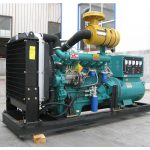Enhancing Performance and Efficiency of Diesel Generators for High-Temperature Operation
Introduction Diesel generators play a crucial role in providing backup power solutions for various industries and applications. One of the challenges faced by diesel generators is operating efficiently in high-temperature environments. High temperatures can affect the performance and reliability of diesel generators, leading to decreased efficiency and potential breakdowns. In this article, we will explore the impact of high temperatures on diesel generators and discuss strategies to enhance their performance and efficiency for high-temperature operation. Understanding Diesel Generators Diesel generators are versatile power generation devices that convert diesel fuel into electrical energy. They consist of an engine, alternator, fuel system, cooling system, and control panel. The engine is the primary component responsible for converting the chemical energy in diesel fuel into mechanical energy. This mechanical energy is then converted into electrical energy by the alternator. The fuel system supplies diesel fuel to the engine, while the cooling system helps regulate the engine temperature to prevent overheating. Impact of High Temperatures on Diesel Generators High temperatures can have a significant impact on the performance and efficiency of diesel generators. 200kw diesel generator for sale of the primary challenges faced by diesel generators in high-temperature environments is overheating. Diesel engines rely on cooling systems to maintain optimal operating temperatures. When exposed to high temperatures, the engine may struggle to dissipate heat efficiently, leading to overheating and potential damage to engine components. In addition to overheating, high temperatures can also affect the combustion process in diesel engines. Diesel engines rely on a precise balance of air and fuel to achieve efficient combustion. High temperatures can alter the air-fuel mixture, leading to incomplete combustion, increased emissions, and reduced fuel efficiency. Furthermore, high temperatures can accelerate wear and tear on engine components, reducing the overall lifespan of the diesel generator. Strategies for Enhancing Performance in High-Temperature Operation To overcome the challenges posed by high temperatures, diesel generator manufacturers and operators can implement various strategies to enhance performance and efficiency. These strategies include: 1. Improved Cooling Systems: Upgrading the cooling system of diesel generators can significantly improve their performance in high-temperature environments. Enhanced cooling systems with better heat dissipation capabilities can help regulate engine temperatures more effectively, reducing the risk of overheating and improving overall efficiency. 2. High-Temperature Resistant Materials: Using high-temperature resistant materials in the construction of diesel generator components can help mitigate the effects of heat exposure. Heat-resistant materials can withstand high temperatures without degrading, prolonging the lifespan of engine components and ensuring reliable operation in extreme conditions. 3. Advanced Engine Design: Diesel generator manufacturers can incorporate advanced engine design features, such as improved combustion chambers and fuel injection systems, to enhance performance in high-temperature environments. Optimizing the engine design for high-temperature operation can improve combustion efficiency, reduce emissions, and increase overall fuel efficiency. 4. Regular Maintenance and Inspections: Regular maintenance and inspections are essential for ensuring the optimal performance of diesel generators in high-temperature environments. Routine checks of engine components, cooling systems, and fuel systems can help identify potential issues early and prevent costly breakdowns due to overheating or wear and tear. 5. Remote Monitoring and Control: Implementing remote monitoring and control systems for diesel generators can provide real-time data on engine performance and operating conditions. Remote monitoring systems can alert operators to potential issues, such as overheating or abnormal fuel consumption, allowing for timely interventions to prevent damage and ensure continuous operation. Conclusion Diesel generators are essential backup power solutions for various industries and applications. Operating diesel generators in high-temperature environments presents unique challenges that can impact performance and efficiency. By implementing strategies such as improved cooling systems, high-temperature resistant materials, advanced engine design, regular maintenance, and remote monitoring, diesel generator manufacturers and operators can enhance the performance and efficiency of diesel generators for high-temperature operation. By addressing these challenges proactively, diesel generators can continue to provide reliable backup power solutions in even the most demanding environments. 